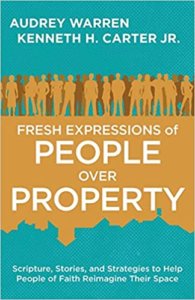Audrey Warren led First United Methodist Church Miami toward a new vision anchored in the redevelopment of its property with a commercial real estate partner. She offers tips to churches considering more entrepreneurial ways of financing ministry.
The words “church” and “business” often don’t mix well. Some of the discomfort comes from stories and conflicts throughout church history. In many places the church became inseparable from the state and owned as much as one-third of all the land in a European nation or city. Given the potential for money to corrupt, it can be hard to reconcile business and ministry and for people in business and ministry to understand the importance of each other. The church has much to teach the business world, and the business world has a few tips on how to sustain the church.
1. Be humble.
We don’t know what we don’t know. Through the process of reimagining a future for our First Church in Miami, we were constantly reminded that there was much we did not know. At our table we had accountants, lawyers, business professionals, doctors, bankers, and developers, yet there were still many things we did not know. When dealing with church property, assume that you know nothing. Hire help when needed. Some people are generous enough to donate their time to the church or offer their services on a retainer agreement. In our case, lawyers and accountants waived their fees until our property deal finally went through. Their expertise helped us tremendously.
2. Remember relationships.
Business is always about relationships. So is ministry. After the project is complete, you will probably see each business or group you worked with again. Be kind and respectful. In all your encounters remember that you represent the congregation and God’s mission to transform the world. Remind your partners that business is about relationships. Before engaging a firm, a nonprofit, or other organization, be sure to know how they can financially give to your church and be a partner with your mission. This strategy helped us work with all the firms that we had interviewed, even the firms that we did not choose to work on our redevelopment project.
3. Keep the long view.
In making business decisions, it is easy to make a quick decision for your current needs. To inform decisions throughout our project, we keep in mind our 10-year plan. We often ask “what if” and guard ourselves from unnecessary risk. We constantly balance what is needed now and what can wait. We cannot have everything all at once; “scope creep” creates unnecessary risk. Like the Israelites, we remember that the promised land is around the corner while we work through any momentary conflict with patience and purpose.
4. Conflict is inherent in change.
If you aren’t comfortable with internal and external conflict, let someone else do the work. Being kind and humble doesn’t eliminate conflict. Kindness is one way to work through conflict, but it doesn’t negate it. Get comfortable with conflict and turn toward each other and not away from each other.
5. Know the rules.
To maintain the congregation’s trust in any financial decision, leaders and interested parties need an understanding of the bylaws and articles of incorporation. These documents ensure that decision-makers have been granted the responsibility to make those decisions. This trust also applies to a process as basic as bookkeeping: who is ultimately responsible for your church’s transactions? Investigate the legal restrictions concerning who can be a partner and what service can be performed on your property. Unrelated business revenue can cause expensive problems for a local church.
6. Remember people, not property, are the church’s purpose and priority.
One day an officer volunteer came to me and closed the door. She spoke plainly. “Pastor, I have been feeling lately that you are more of a businessperson than a pastor.” I went home and cried for hours. I questioned my call and motivations. I confessed to God the times when I put an email message above making a call to a member. I also experienced God’s grace and knew that God understood the complexities of my call and vocation in that moment. I prayed God would give me the strength I needed to keep going and would open doors to bring us more help. Within six months we were able to hire a full-time operation manager and another pastor to assist in our work.
Keeping love central has been part of keeping the people as our priority. Our property is simply a tool to help us love more people in the name of Jesus Christ.
This material is excerpted from Fresh Expressions of People over Property by Audrey Warren and Kenneth H. Carter, Jr. ©2020 Abingdon Press Used by Permissions. All rights reserved. The book is available at Cokesbury and Amazon.
Related Resources
- Leveraging Your Church’s Assets, a Leading Ideas Talks podcast episode featuring Jacki Jones-Smith
- The Coming Revolution in Church Economics, a Leading Ideas Talks podcast episode featuring Mark DeYmaz
- Ways Your Building Can Generate Income and Bless Your Community by Mark DeYmaz







